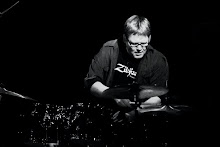Okay, I haven't had a rant in a while and since I'm cooped up like everyone else, I might as well let fly!
I, like everyone else, am not performing live these days. One way I try to keep my musician instincts in place is to play along with recordings. Now, I think it's important to make distinctions between drum covers, loops, play alongs, and playing to recordings
Let's start with drum covers. These are almost always incidences of individuals platying along to a recording and playing exactly what's on the recording. Someone learns the drum part to a U2 or Nirvana tune, and plays it exactly that way.
Pluses- easy to tell if you're correct, can work on steady time and correct feel.
Minuses- don't really need to listen beyond time and feel, not creating anything new.
Loops tend to be just a piece of a composition repeated over and over again with no variation.
Pluses- Can concentrate on a particular groove without having worry about shaping a song form. Good for playing "against something". (See my groove surfing " post. )
Minuses- Not dealing with a whole composition or the time/dynamic variables that go with it.
Play alongs are a little different. They are usually recorded to click and one instrument at a time so they can be played on with the drums removed. They usually involve different interpretations of difficult compositions and are usually about learning an arrangement and playing it the same every time.
Pluses- Good for learning and memorizing arrangements, showcasing hard material
Minuses- Usually so concerned with showcasing drumming they don't hold up as compositions. Click allows one to get "lazy" about listening.
I feel playing to recordings creates particular challenges because often we are playing with recordings done without click so we have to learn to "balance" all the natural dents and shifts in the time. Therefore we can't get so wrapped up in what we're playing that we stop listening on a deep level. This also involves reacting to what's going on in the recording rather than just aping a part or playing some slick stuff over a backing track or loop.
Other ways we can challenge ourselves to listen on a deep level are 1) Play the recording at a lower volume than is naturally comfortable ( also helps considerably with developing one's low dynamic range ) and 2) Playing along with music you've never heard before and trying to build a part for the song on the spot, and commit to what one's done even if it feels like wrong turn.
Okay, what else?
Oh yea, I finally figured out why I find pads such an unfulfilling playing and listening experience. Acoustic drums and cymbals vibrate, A LOT! I personally find a lot of joy and excitement to these vibrations, to the point that I think my physical and mental health is improved when I experience these on a regular basis. It's okay if you don't feel that way, I've just realized this is what works for me….
Finally, I recently saw a relatively famous drum teacher showing an exercise where one plays paradiddles and the recites the alphabet, then recites it by speaking two letters then thinking the next 2 etc. I think maybe he even got into reciting it backwards but I didn't get that far.
Hmmmmmm……
How is this useful? Well, I suppose it helps us remember our alphabet, but I assume most of us have that together, more or less. Maybe if one is doing some sort of drum/spoken word solo gig, although I don't think those come up that much. It's a bit sad because players (especially young ones, and I was certainly in this group myself) see something like this and think, " this is difficult, so I should learn it". The problem is, it also has nothing to do with playing music, Now, playing paradiddles while singing a standard tune, or even counting bars into 4 and 8 bar phrase lengths. Long story short, time is valuable. Don't waste it practicing dumb things……..
Thursday, April 16, 2020
Subscribe to:
Post Comments (Atom)

No comments:
Post a Comment